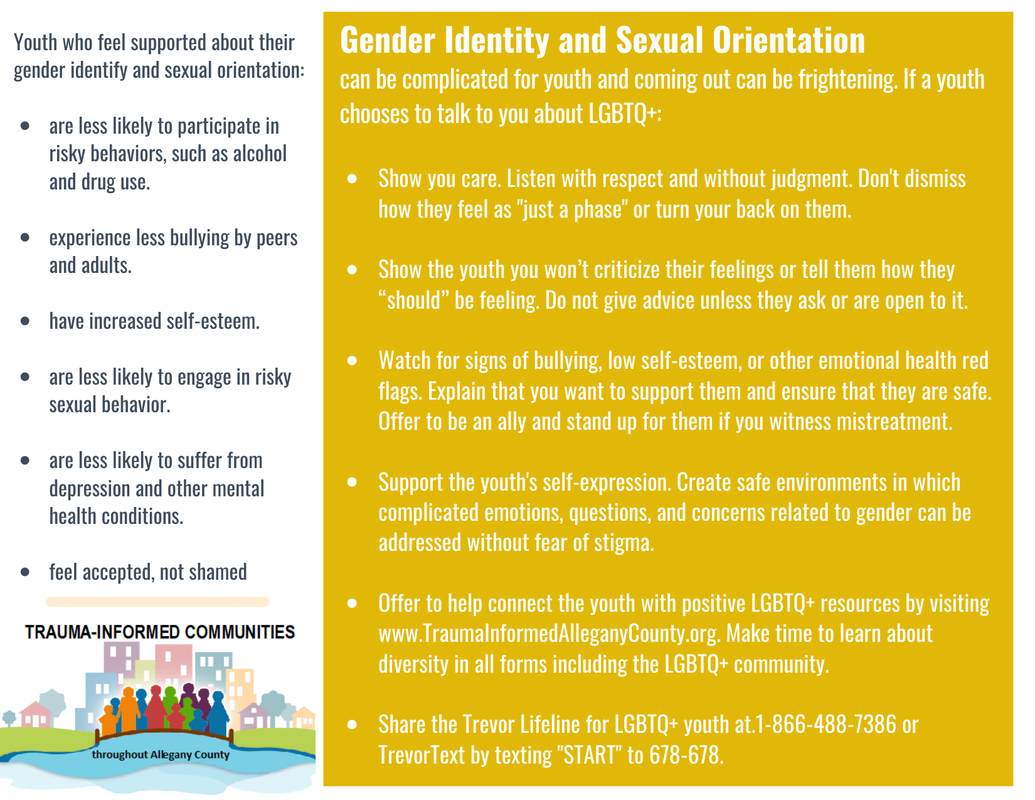- Home
- Trauma-Informed Education
- Trauma Overview
-
#onecaringadult
- #Onecaringadult Allegany County App
- #onecaringadult- Academic Stress
- #onecaringadult- Alcohol and Other Drugs
- #onecaringadult- Bullying
- #onecaringadult- LGBTQ+
- #onecaringadult- Childhood Neglect
- #onecaringadult- E-Cigarettes and Vaping
- #onecaringadult- Eating Disorders
- #onecaringadult- Mental Health
- #onecaringadult- Online Sexual Exploitation
- #onecaringadult- Non-Suicidal Self-Injury
- #onecaringadult- Sexual Abuse
- #onecaringadult- Sexually Transmitted Infections
- #onecaringadult- Suicide Prevention
- #onecaringadult- Teen Dating Violence
- #onecaringadult- Teen Pregnancy
- #onecaringadult- Toxic Stress
- #onecaringadult- Vaping & E-Cigarettes
- #onecaringfriend
- Trauma-Informed Resources
Patty Amidon, Cornell Coopertive Extension
Sexual orientation and gender are important aspects of a young person’s identity. Understanding and expressing sexual orientation and gender and developing related identities are typical development tasks that vary across children and youth. For example, some youth may be unsure of their sexual orientation, whereas others have been clear about it since childhood and have expressed it since a young age. Expressing and exploring gender identity and roles is also a part of normal development. The process of understanding and expressing one’s sexual orientation and gender identity is unique to each individual. It is not a one-time event and personal, cultural, and social factors may influence how one expresses their sexual orientation and gender identity.
WHAT YOU NEED TO KNOW ABOUT SUPPORTING LGBTQ+ YOUTH
|
TIPS FOR LGBTQ+ ADULT ALLIES
|
SUPPORTING LGBTQ+ YOUTH
|
WHAT CAN ORGANIZATIONS DO TO SUPPORT LGBTQ+ YOUTH
|
HELPFUL LINKS
|
- Home
- Trauma-Informed Education
- Trauma Overview
-
#onecaringadult
- #Onecaringadult Allegany County App
- #onecaringadult- Academic Stress
- #onecaringadult- Alcohol and Other Drugs
- #onecaringadult- Bullying
- #onecaringadult- LGBTQ+
- #onecaringadult- Childhood Neglect
- #onecaringadult- E-Cigarettes and Vaping
- #onecaringadult- Eating Disorders
- #onecaringadult- Mental Health
- #onecaringadult- Online Sexual Exploitation
- #onecaringadult- Non-Suicidal Self-Injury
- #onecaringadult- Sexual Abuse
- #onecaringadult- Sexually Transmitted Infections
- #onecaringadult- Suicide Prevention
- #onecaringadult- Teen Dating Violence
- #onecaringadult- Teen Pregnancy
- #onecaringadult- Toxic Stress
- #onecaringadult- Vaping & E-Cigarettes
- #onecaringfriend
- Trauma-Informed Resources
